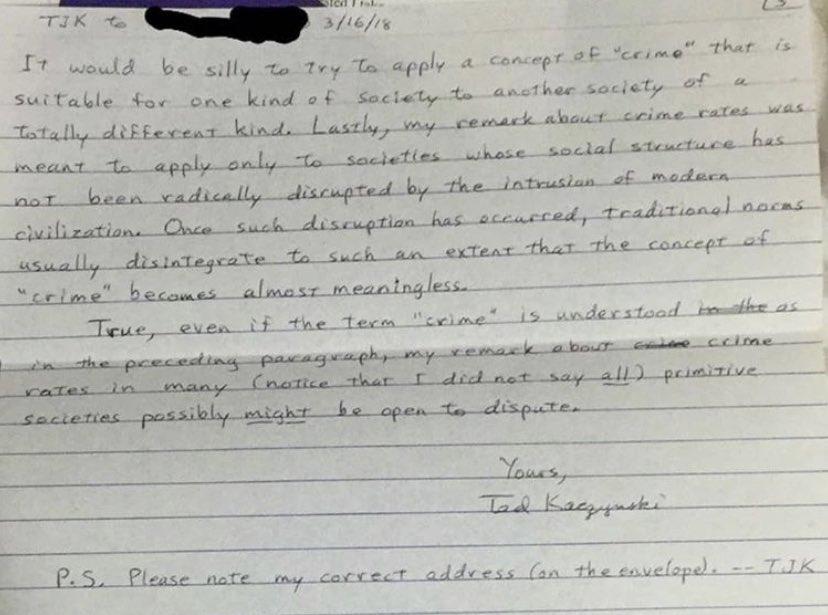Ted Kaczynski’s Letter to Mr. K.
Letter to Ted
To Mr. Theodore Kaczynski,
I am composing this letter to you for an informal discussion as well as some academic support. Currently, I am writing a research paper about modernity and philosophy of the past and I feel as if your ideas incorporate keen insight on the topic, seeing how die majority of books and articles on the sort arc one-sided and bland I have read many articles on the topic and Industrial Society and Its Future incorporates the most fascinating and controversial ideas Aside from the academics. I had some other miscellaneous questions that I would like to ask For now, I will introduce myself.
While I do not desire to give away my name, perhaps dial can come in a future letter, I would like to distinguish that I am a high school student I am very captivated by your work Industrial Society and Its Future as it is an impressive piece that has compelled me to think, not to mention, been the basis of a multitude of my school papers While I do admire the thought that has been put into your work. I do find myself disagreeing with some of your points (for now! will only entail one). I hope to have a discussion about these points to belter appreciate the thought that has been put into them I thank you for your time and availability.
Before getting into the counterargument pertaining to your work. I have some questions that I would like to ask:
-
First and foremost, how were your friendships with Timothy McVeigh and Ramzi Yousef?
-
Of the three, the reasons for your actions seem to be the most divergent from the others.
-
Did you all take part in discussing your ideas and sharing thoughts on certain topics?
-
Did McVeigh or Yousef show any signs of agreeing with your ideas, or you theirs?
-
Did you ever find yourself questioning the rationality of McVeigh or Yousefs actions?
-
-
What are your opinions on nationalism or so called “ethno-nationalism”?
-
In paragraph 18 of your work. Industrial Society and Its Future, you say “Leftists are antagonistic to genetic explanations of human abilities or behavior because such explanations tend to make some persons appear superior or inferior to others” do you believe that there are superior races or a superior gender?
-
If there is superiority among races or the genders, what constitutes for their superiority?
-
Is evolution a cause of superiority and differences among the races and genders?
-
-
Is climate change a threat io the world’s inhabitants?
-
With only a select few being able to replicate” and “study” climate change, do you believe that the study of climate change is able to be taken in as truth.
-
If climate change is a pending issue, what or who is to blame for the effect of it?
-
My apologies for the mass of questions, feel free to prioritize other questions over some or focus Particular group of questions. I felt that asking many questions would result in more answered rather than asking a few and having little to none answered.
I have one question that I would like to cover more though, and this is my disagreement with Industrial Society and Its Future. Within paragraph 154 you go on to say “But many or most primitive societies have a low crime rate in comparison with that of our society...” and that is where the disagreement is. If one were to examine the crime rates of industrialized (assuming industry is a factor of civility) societies like China or Japan, you would find that the crime rates of these countries arc relatively low. How ever, if the same person were to look at un-industrialized societies, such as some South I American countries or African countries (specifically ones that are generous producers of agricultural Products) one would find the crime rates are significantly higher Especially looking at things proportionally, China has over one billion people, while some African countries have little over one । million people. If you were to take the crime rate of each of these countries and account for population, the crime rates of the un-industrialized societies are even more staggering The United States is a superb example of this, primarily white northern areas that were at the height of industry, have low crime rate compared to the primarily black un-industnalized south My argument is that primitive societies, I comprised of primitive peoples, do have higher crime rates than sophisticated societies. The reason that primitive societies lack in the crimes that our society is full of; is simply due to the fact that the primitive societies have no concept of the crimes that sophisticated societies have. An example is hacking while in a sophisticated society the tampering of computers is illegal, a primitive society has no concept of what this is. The fact of the matter is that primitive peoples arc more prone to criminality than peoples in a civil society. This is chiefly the case if it is a society of various levels like the United States. A primitive person or society is more prone to criminality if the population to which they are relative to is more civil than they are. Please assert your opinions on my counter-argument; I am ecstatic to hear your reply.
I thank you very much for your time and even more so for your response should I receive one. Not only will this help me with my academics, but 1 believe it will enable me to grow intellectually as well. And to have the opportunity to openly consider and debate various issues with someone who has a high regard for intellect is wonderful. The pleasure is all mine to have this opportunity to write you and I graciously anticipate your reply.
Your’s Truly
[REDACTED]
P.S. What is your favorite icecream flavor? I believe that McVeigh’s was mint chocolate chip.
Ted’s Response
Dear Mr. K.:
To answer your questions:
-
I was acquainted with McVeigh & with the other individual{1} you mention, but they were never friends of mine. The “other individual”, by the way, was a habitual liar. I’m not sure either of these two individuals had any definite goals other than destructiveness for its own sake, but their goals, if they had any, had nothing in common with my goals.
-
The goals of nationalism and ethno-nationalism are the goals only of fools. Such goals only distract attention from the one goal that is overwhelmingly more important than all other goals put together. To state it in simplified terms, that one goal is to get rid of the technological system before it gets rid of us. See ISAIF (*Industrial Society and Its Future), P 206. In the passage you quote from ISAIF, P 18, underline the word “appear”. I was merely making a point about the psychology of leftists. I’m not interested in questions of “superiority” or “inferiority” except to the extent that I am firmly opposed to any notions of ethnic, racial, or gender “superiority” or “inferiority”, because such notions only generate conflicts that distract attention & energy from the main goal. See ISAIF, P 191–92. Whether we like it or not we’re all in this together, and any successful effort to get rid of the technological system will have to span all races, ethnic-groups, genders, etc.
-
On climate change: My answer is “yes.” You need to read my books
Anti-Tech Revolution: Why and How (2016), available from
www.feralhouse.com or amazon.comVolume 1 of a new and greatly improved edition of Tech Slavery will soon be published by Fitch & Madison.
You’ll find my views on global warming in Tech Slavery (2010), pages 303, 314, 363–64 and Anti-Tech Revolution, pages 64–68, 215–17.
If you find after reading the books that you would like to assist us in building an anti-tech movement, and if you are willing to put a great deal of time & effort into the work, then I invite you to write me again. We need young people like you!
One last point before I close: The “primitive” societies that you mention in the next-to-last paragraph of your letter are not normally considered primitive — not by a long, long way. To be considered “primitive”, a society must at a minimum satisfy the following requirements: It must have no form of writing; no cities; no social organization above the level of the tribe. And “crime rate” here refers to crime as defined by the norms of the society in question. E.g., if the society in question does not consider it a crime for people to fight each other with deadly weapons, then such fighting (even if it has fatal results) is not included in the crime rate as I’m using the term. It would be silly to try to apply a concept of “crime” that is suitable for one kind of society to another society of a totally different kind. Lastly, my remark about crime rates was meant to apply only to societies whos social structure has not been radically disrupted by the intrusion of modern civilization. Once such disruption has occurred, traditional norms usually disintergrate to such an extent that the concept of “crime” becomes almost meaningless.
True, even if the term “crime” is understood as in the preceding paragraph, my remark about crime rates in many (notice that I did not say all) primitive societies possibly might be open to dispute.
Yours
Ted Kaczynski
P.S. Please note my correct address (on the envelope). — TJK





{1} I won’t mention his name because I think he is still a federal inmate, and federal inmates are not allowed to mention the names of other federal inmates in their correspondence. Actually, I’m surprised that your letter was allowed to reach me, given that you did mention this individual.
